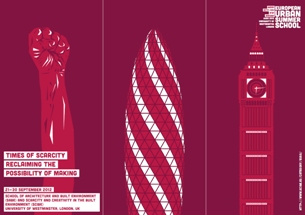 AESOP-ECTP-IFHP-ISOCARP EUROPEAN URBAN SUMMER SCHOOL 2012, University of Westminster, London, UK APPLICATION DEADLINE EXTENDED TILL 24 JUNE
AESOP-ECTP-IFHP-ISOCARP EUROPEAN URBAN SUMMER SCHOOL 2012, University of Westminster, London, UK APPLICATION DEADLINE EXTENDED TILL 24 JUNE
In our times of rapid change, young planners and professionals involved in the processes of urban transformation must develop and adopt new and more holistic approaches to planning and design in order to engage with an increasingly urban world in a meaningful manner and to propose creative interventions that go beyond the immediately physical.
Globalisation, climate change, resource depletion and financial crises are the prevailing – and often crippling – conditions, which shape our immediate professional and academic lives and longer-term futures. The 3rd European Urban Summer School (EUSS), hosted by the University of Westminster, School of Architecture and the Built Environment in September 2012, aims to bring together young and established planning and design professionals from all over Europe (and further away) and both emerging and experienced academics to develop a better understanding of some of the most pressing contemporary issues related to the built environment and to amplify and strengthen the links between planning- and design-relevant research and professional practice.
Times of Scarcity – Reclaiming the Possibility of Making
The EUSS is an invitation – a call to arms – to engage in the quest for and development of new ways of thinking about and new tools in response to emerging issues of scarcity – a condition defined by the insufficiency of cultural, social, demographic and/or economic resources – in the context of the built environment. Scarcity is about more than simple resource depletion: it is embedded in political, social and ecological systems. How and by whom is scarcity generated, engineered, constructed or perceived? What are we, as planners and designers, to do under conditions of scarcity in the built environment? The EUSS is an invitation to reclaim the possibility of making the city in our times of scarcity.
London is now a leading global city, the most visited city in the world and its largest financial centre. London will host the Summer Olympic Games 2012. In September 2012, the city – its population and infrastructure – will be recovering from the event and beginning to cope with its legacy.
Participants in the EUSS will work and test their ideas on the case of a ‘deprived’ East London ward surrounded by highways and railway lines and located in-between central London, the Canary Wharf Estate and the Olympic site: Bromley-by-Bow. This is a contested urban territory typical of London, with many aspects of social inequality manifested spatially and socially. Sixty-one percent of households in this area are from ethnic minorities (particularly immigrants from Bangladesh); 43% of people aged 16-74 have no qualifications; unemployment is at almost three times the national level; almost 70% of tenure is council housing/housing association. The area features almost five times the national level of overcrowding and residents exhibit exceptionally poor health. Spectacular event architecture, hastily refurbished façades in anticipation of international visitors and the everyday reality of historically neglected East London all offer the context for EUSS explorations: a charged territory awaiting the engagement of young planning and design professionals and their proposals for intelligent, creative interventions.